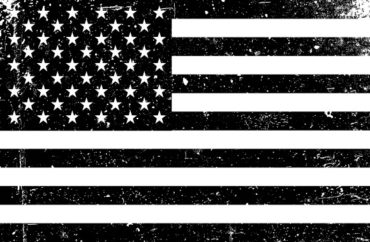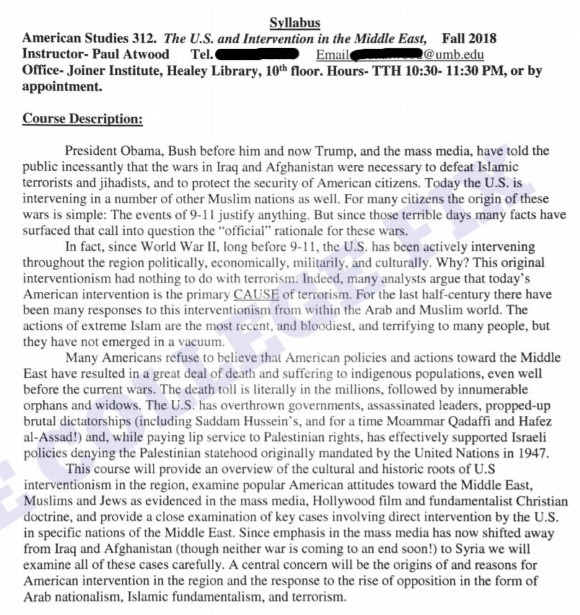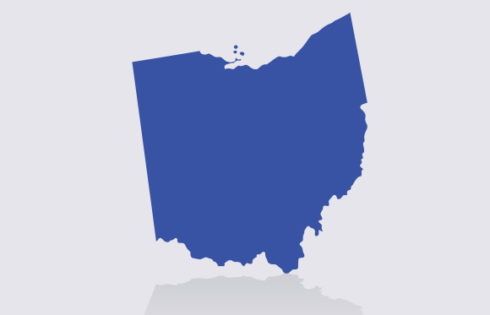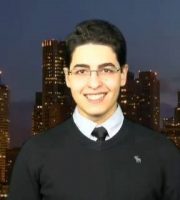
BOSTON — An American Studies class at the University of Massachusetts Boston teaches students that United States military intervention is the primary cause of terrorism in the world today.
How do I know? I was briefly enrolled in the Fall 2018 course. Paul Atwood, a former Vietnam-era Marine turned anti-war protester, teaches The U.S. and Intervention in the Middle East.
During the course’s first two lectures earlier this month, I listened as Atwood, a senior lecturer in the College of Liberal Arts, scrutinized instances of American military intervention with what I perceived as a conspiratorial lens, including the assertion that the U.S. government knew more than it has let on about the terrorist acts of Sept. 11, stopping short of calling it an inside job.
Massachusetts has some of the strictest anti-recording laws in the nation or else I would have gladly grabbed my cellphone to document his classroom lectures at my public university and let his words speak for themselves. But his syllabus will also suffice.
“President Obama, Bush before him and now Trump, and the mass media, have told the public incessantly that the wars in Iraq and Afghanistan were necessary to defeat Islamic terrorists and jihadists, and to protect the security of American citizens,” the course syllabus reads. “Today the U.S. is intervening in a number of other Muslim nations as well. For many citizens the origin of these wars is simple: The events of 9-11 justify anything. But since those terrible days many facts have surfaced that call into question the ‘official’ rationale for these wars.”
“In fact, since World War II, long before 9-11, the U.S. has been actively intervening throughout the region politically, economically, militarily, and culturally,” the syllabus adds. “Why? The original interventionism had nothing to do with terrorism. Indeed, many analysts argue that today’s American intervention is the primary CAUSE of terrorism.” (Emphasis in original.)
“… Most Americans refuse to believe that American policies and actions toward the Middle East have resulted in a great deal of death and suffering to indigenous populations, even well before the current wars,” the syllabus states. “… The U.S. has overthrown governments, assassinated leaders, propped-up brutal dictatorships …”
One of the first reading assignments for the class was focused on “Operation Northwoods,” a proposal from military brass during the height of tensions with communist Cuba in the 1960s for the CIA to pose as Cuban military and intentionally attack America to justify a war against Cuba. President John F. Kennedy shot down the proposal.
At one point Atwood told us he believes Kennedy’s assassination was an inside job. Frustrated, I finally spoke up in class, saying that’s Vladimir Putin’s Cold War theory too, and I don’t give conspiracy theories much weight.

Next we were required to read an article in The Progressive on “How the U.S. Intentionally Destroyed Iraq’s Water Supply.” In class, Atwood used this as an example of the atrocities Americans turn a blind eye to, saying the United States violated the Geneva Convention for oil money. Yet the article itself notes the United Nations was on board with these sanctions—not just the United States.
The next assigned reading was a 1948 quote from George Kennan, former Policy Planning Chief for the U.S. State Department, which read: “Were the Soviet Union to sink tomorrow under the waters of the ocean, the American military establishment would have to go on substantially unchanged until some other adversary could be invented. Anything else would be an unacceptable shock to the American economy.”
In fact, Atwood’s assertion that the U.S. is dependent on a perpetual war economy is spelled out in his 2010 book “War and Empire: The American Way of Life.”
“The book shows that, far from being dragged reluctantly into foreign entanglements, America’s leaders have always picked its battles in order to increase their influence and power, with little regard for the American soldiers and ‘enemy’ civilians killed or made to suffer in the process,” its Amazon description states.
Our next reading assignment was an interview by a French “social-democratic” paper asking Jimmy Carter’s National Security Adviser, Zbigniew Brzezinski, about the U.S. decision to fund anti-Soviet groups in Afghanistan, which he defended. We were also given a couple political cartoons showing the rich eating the poor and criticisms of large multinational corporations. On the first day of class he also told us he voted for Bernie Sanders.
Additional readings listed in the syllabus included a wide range of pro-Palestinian writings. Atwood states in his syllabus that America has “effectively supported Israeli policies denying the Palestinian statehood originally mandated by the United Nations in 1947.”
Frustrated by the one-sided, extremist nature of the course, I researched Atwood and discovered he writes for The Radical Teacher, a journal that bills itself as a “socialist, feminist, and anti-racist journal on the theory and practice of teaching.”
Atwood himself admits he’s been greatly influenced by anti-American propagandist historian Howard Zinn, noting in a short memoir that he wrote his dissertation under Zinn’s “guidance and influence.”
I knew I must drop the course. I am open to learning new ideas, digesting controversial facts, and hearing criticism of the U.S. military. What I do not want my tax and tuition dollars wasted on, however, is a semester’s worth of biased anti-military diatribes that do not offer balanced, thorough and multi-dimensional approaches to the subject of The U.S. and Intervention in the Middle East.
I compliment Atwood on his willingness to be questioned and challenged in class, but given his Marxist worldview I’m concerned my opinions in the multiple essays required for this course would leave a bitter taste in this scholar’s mouth. Debating and rebutting a professor in essays is exactly what caused me to fail an upper level political science class last semester—and I refuse to compromise my conscience to placate a professor and pass a class.
MORE: Prof DEBUNKS study claiming right-wing extremists in U.S. more deadly than Islamic terrorists
IMAGE: Pashabo / Shutterstock
Like The College Fix on Facebook / Follow us on Twitter






Please join the conversation about our stories on Facebook, Twitter, Instagram, Reddit, MeWe, Rumble, Gab, Minds and Gettr.